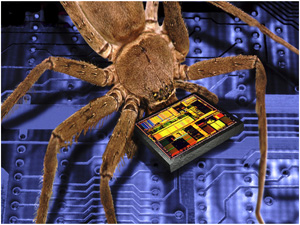



Date:14/11/11
 - Iran said on Sunday it had detected the Duqu computer virus that experts say is based on Stuxnet, the so-called "cyber-weapon" discovered last year and believed to be aimed at sabotaging the Islamic Republic's nuclear sites.
- Iran said on Sunday it had detected the Duqu computer virus that experts say is based on Stuxnet, the so-called "cyber-weapon" discovered last year and believed to be aimed at sabotaging the Islamic Republic's nuclear sites.
The head of Iran's civil defense organization told the official IRNA news agency that computers at all main sites at risk were being checked and that Iran had developed software to combat the virus.
"We are in the initial phase of fighting the Duqu virus," Gholamreza Jalali, was quoted as saying. "The final report which says which organizations the virus has spread to and what its impacts are has not been completed yet.
"All the organizations and centers that could be susceptible to being contaminated are being controlled," he said. News of Duqu surfaced in October when security software maker Symantec Corp said it had found a mysterious virus that contained code similar to Stuxnet.
While Stuxnet was aimed at crippling industrial control systems and may have destroyed some of the centrifuges Iran uses to enrich uranium, experts say Duqu appeared designed to gather data to make it easier to launch future cyber attacks.
Symantec said: "Duqu is essentially the precursor to a future Stuxnet-like attack." Instead of being designed to sabotage an industrial control system, the new virus is designed to gain remote access capabilities, it said in a report issued last month. Iran said in April it had been targeted by a second computer virus which it identified as "Stars."
It was not immediately clear if Stars and Duqu were related but Jalali described Duqu as the third virus to hit Iran. Tehran said Stuxnet had not inflicted serious damage before it was detected and blamed the United States and Israel for the virus which appeared to be aimed at crippling the nuclear program they say is aimed at making atomic weapons, a charge Iran denies.
The International Atomic Energy Agency issued a report last week that contained what it called credible evidence pointing to military dimensions to Iran's atomic activities, fueling demands in Washington and Europe for further sanctions.
Iran dismissed the report as politicized and full of "lousy" and unreliable intelligence work. The speaker of Iran's parliament said on Sunday the assembly would "review" relations with the U.N. nuclear watchdog.
Iran says has detected Duqu computer virus
 - Iran said on Sunday it had detected the Duqu computer virus that experts say is based on Stuxnet, the so-called "cyber-weapon" discovered last year and believed to be aimed at sabotaging the Islamic Republic's nuclear sites.
- Iran said on Sunday it had detected the Duqu computer virus that experts say is based on Stuxnet, the so-called "cyber-weapon" discovered last year and believed to be aimed at sabotaging the Islamic Republic's nuclear sites. The head of Iran's civil defense organization told the official IRNA news agency that computers at all main sites at risk were being checked and that Iran had developed software to combat the virus.
"We are in the initial phase of fighting the Duqu virus," Gholamreza Jalali, was quoted as saying. "The final report which says which organizations the virus has spread to and what its impacts are has not been completed yet.
"All the organizations and centers that could be susceptible to being contaminated are being controlled," he said. News of Duqu surfaced in October when security software maker Symantec Corp said it had found a mysterious virus that contained code similar to Stuxnet.
While Stuxnet was aimed at crippling industrial control systems and may have destroyed some of the centrifuges Iran uses to enrich uranium, experts say Duqu appeared designed to gather data to make it easier to launch future cyber attacks.
Symantec said: "Duqu is essentially the precursor to a future Stuxnet-like attack." Instead of being designed to sabotage an industrial control system, the new virus is designed to gain remote access capabilities, it said in a report issued last month. Iran said in April it had been targeted by a second computer virus which it identified as "Stars."
It was not immediately clear if Stars and Duqu were related but Jalali described Duqu as the third virus to hit Iran. Tehran said Stuxnet had not inflicted serious damage before it was detected and blamed the United States and Israel for the virus which appeared to be aimed at crippling the nuclear program they say is aimed at making atomic weapons, a charge Iran denies.
The International Atomic Energy Agency issued a report last week that contained what it called credible evidence pointing to military dimensions to Iran's atomic activities, fueling demands in Washington and Europe for further sanctions.
Iran dismissed the report as politicized and full of "lousy" and unreliable intelligence work. The speaker of Iran's parliament said on Sunday the assembly would "review" relations with the U.N. nuclear watchdog.
Views: 1020
©ictnews.az. All rights reserved.Similar news
- Cellphone Use May Raise Cancer Risk
- Australian police pushes cyber safety education
- Vietnam aims to lead in e-government
- Senate Website Gets Hacked
- US builds net for cyber war games
- Japan enacts anti-computer virus law
- India passes law vs e-waste
- Anonymous Declares War On The City Of Orlando
- Microsoft highlights evolving dangers as online identity data proliferates
- Consumers want internet security to be provided by banks
- Government facilities targets of cyber attack
- South Korean web attacks might been war drill
- Sri Lanka to Establish National Passport Database to Increase Border Security
- Hi-tech crime agencies set to employ information security professionals
- Phone hacking and online campaign bring down the News of the World





















